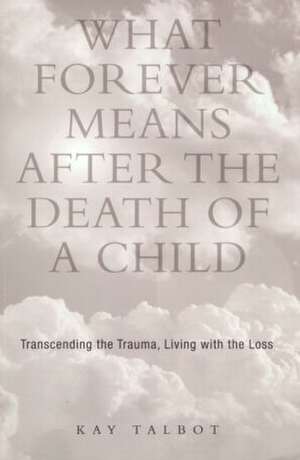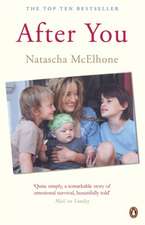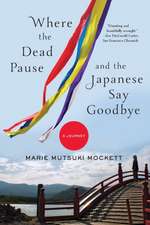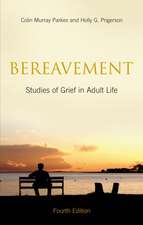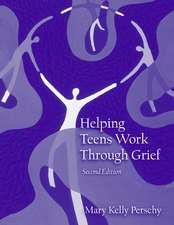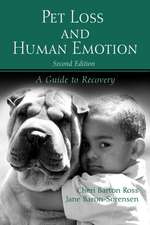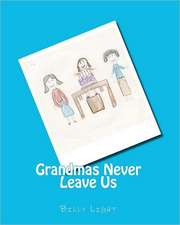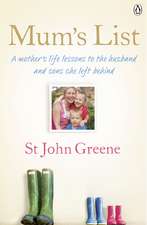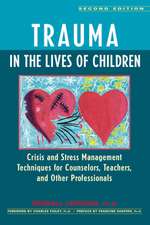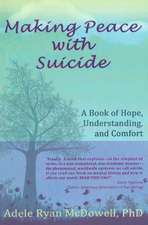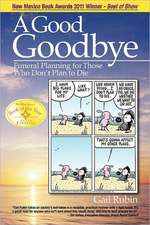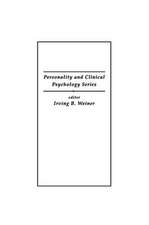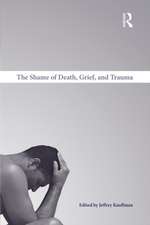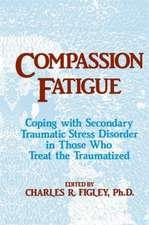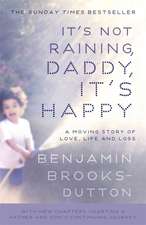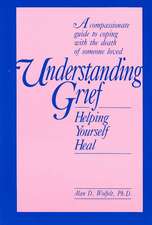What Forever Means After the Death of a Child: Transcending the Trauma, Living with the Loss: Series in Trauma and Loss
Autor Kay Talboten Limba Engleză Paperback – 15 mar 2002
| Toate formatele și edițiile | Preț | Express |
|---|---|---|
| Paperback (1) | 335.97 lei 6-8 săpt. | |
| Taylor & Francis – 15 mar 2002 | 335.97 lei 6-8 săpt. | |
| Hardback (1) | 1095.75 lei 6-8 săpt. | |
| Taylor & Francis – 14 apr 2016 | 1095.75 lei 6-8 săpt. |
Preț: 335.97 lei
Preț vechi: 353.65 lei
-5% Nou
Puncte Express: 504
Preț estimativ în valută:
64.30€ • 66.88$ • 53.08£
64.30€ • 66.88$ • 53.08£
Carte tipărită la comandă
Livrare economică 15-29 aprilie
Preluare comenzi: 021 569.72.76
Specificații
ISBN-13: 9781583910801
ISBN-10: 1583910808
Pagini: 296
Dimensiuni: 152 x 229 x 17 mm
Greutate: 0.55 kg
Ediția:1
Editura: Taylor & Francis
Colecția Routledge
Seria Series in Trauma and Loss
Locul publicării:Oxford, United Kingdom
ISBN-10: 1583910808
Pagini: 296
Dimensiuni: 152 x 229 x 17 mm
Greutate: 0.55 kg
Ediția:1
Editura: Taylor & Francis
Colecția Routledge
Seria Series in Trauma and Loss
Locul publicării:Oxford, United Kingdom
Public țintă
Professional Practice & DevelopmentCuprins
List of Tables. List of Figures. Series Editor's Foreword. Preface. Prologue. Acknowledgements. What It Means to Be a Parent After a Child Had Died. The "Mothers Now Childless" Study: Research Design and Findings. When a Child Dies, Does Grieving Ever End? One Death - A Thousand Strands of Pain: Finding the Meaning of Suffering. Bereaved Parents' Search for Understanding: The Paradox of Healing. Confronting a Spiritual Crisis: Where is God When Bad Things Happen? Confronting an Existential Crisis: Can Life Have Purpose Again? Deciding to Survive: Reaching Bottom - Climbing Up. Remembering With Love: Bereaved Parents as Biographer. Reaching Out to Help Others: Wounded Healers. Reinventing the Self: Parents Ask, "Who Are We Now?". The Legacy of Loss. References. Resources. Appendices. Index.
Notă biografică
Kay Talbot is a psychotherapist working with individuals, families, and groups experiencing life transitions. Her groundbreaking research on the death of an only child has been published in leading journals.
Recenzii
"What Forever Means After the Death of a Child will become a classic because Dr. Talbot combines all of the vital elements of a vital resource for helping... [T]he few good studies of parental survivorship are explained and applied in ways that provide concrete direction to helpers and to the parents themselves." -- Charles R. Figley, Ph.D., Series Editor and Director, Florida State University Traumatology Institute
"This is a stunning book--a cut above the rest on this topic...a particularly powerful and personally-impacting resource, this book inherently incorporates much of the newest thinking in the fields of thanatology and traumatology...I recommend it highly." -- Therese A. Rando, Ph.D., BCETS, BCBT,, The Institute for the Study and Treatment of Loss; Author of Treatment of Complicated Mourning and Clinical Dimensions of Anticipatory Mourning; Editor,Parental Loss of a Child
"This book is on the cutting edge of our studies of grief. It reaffirms the continuing ties that bereaved parents maintain with their deceased child and reminds us that even the most horrendous events can be cauldrons for growth. This book needs to be read by all who seek to understand or assist persons struggling with loss." -- Kenneth J. Doka, Ph.D., Senior Consultant, The Hospice Foundation of America
"Talbot, a skilled writer, counselor and friend to the bereaved, as well as a bereaved parent uncovers the intensity of loss, frequently measured in the language and yardsticks of trauma, as parents struggle to respond to the death of a child.
When do you recover from the death of a child? It is the question fraught with dilemmas, from the rich impressions of the pain experienced by grieving parents, to the very definitions implicit in the question. The fact is that losing a child is one of the greatest fears of life and its the biggest agony, yet society seems content to say, Life moves on and you will, too. Ignorance in society, even in providers and the loved ones and friends who surround the bereaved parents, continues to frustrate the parents and isolate them further and further from the hope and inner peace that might even allow for some breath of life and purpose." -- Resources Hotline, 2002
"The death of any child is a tragedy that rips apart a mother and father's life, shattering their world of parenthood, the focus of life, and destroying future dreams. Kay Talbot has sensitively spoken of her personal plight, compassionately presented the inner world of grieving parents, and professionally created a framework or research and data to enrich the reader's understandings of the parentally bereaved after the death of an only child. As Charles Figley explains in the preface to the book, "Talbot combines all of the vital elements of a vital resource for helping." -- Linda Goldman in Death Studies, May 2003
"A valuable, in depth look at grief through the experiences of mothers dealing with the death of an only child." -- Contemporary Psychology
"What Forever Means After the Death of a Child will become a classic because Dr. Talbot combines all of the vital elements of a vital resource for helping... [T]he few good studies of parental survivorship are explained and applied in ways that provide concrete direction to helpers and to the parents themselves." -- Charles R. Figley, Ph.D., Series Editor and Director, Florida State University Traumatology Institute
"This is a stunning book--a cut above the rest on this topic...a particularly powerful and personally-impacting resource, this book inherently incorporates much of the newest thinking in the fields of thanatology and traumatology...I recommend it highly." -- Therese A. Rando, Ph.D., BCETS, BCBT,, The Institute for the Study and Treatment of Loss; Author of Treatment of Complicated Mourning and Clinical Dimensions of Anticipatory Mourning; Editor,Parental Loss of a Child
"This book is on the cutting edge of our studies of grief. It reaffirms the continuing ties that bereaved parents maintain with their deceased child and reminds us that even the most horrendous events can be cauldrons for growth. This book needs to be read by all who seek to understand or assist persons struggling with loss." -- Kenneth J. Doka, Ph.D., Senior Consultant, The Hospice Foundation of America
"Talbot, a skilled writer, counselor and friend to the bereaved, as well as a bereaved parent uncovers the intensity of loss, frequently measured in the language and yardsticks of trauma, as parents struggle to respond to the death of a child.
When do you recover from the death of a child? It is the question fraught with dilemmas, from the rich impressions of the pain experienced by grieving parents, to the very definitions implicit in the question. The fact is that losing a child is one of the greatest fears of life and its the biggest agony, yet society seems content to say, Life moves on and you will, too. Ignorance in society, even in providers and the loved ones and friends who surround the bereaved parents, continues to frustrate the parents and isolate them further and further from the hope and inner peace that might even allow for some breath of life and purpose." -- Resources Hotline, 2002
"The death of any child is a tragedy that rips apart a mother and father's life, shattering their world of parenthood, the focus of life, and destroying future dreams. Kay Talbot has sensitively spoken of her personal plight, compassionately presented the inner world of grieving parents, and professionally created a framework or research and data to enrich the reader's understandings of the parentally bereaved after the death of an only child. As Charles Figley explains in the preface to the book, "Talbot combines all of the vital elements of a vital resource for helping." -- Linda Goldman in Death Studies, May 2003
"A valuable, in depth look at grief through the experiences of mothers dealing with the death of an only child." -- Contemporary Psychology
"What Forever Means After the Death of a Child will become a classic because Dr. Talbot combines all of the vital elements of a vital resource for helping... [T]he few good studies of parental survivorship are explained and applied in ways that provide concrete direction to helpers and to the parents themselves." -- Charles R. Figley, Ph.D., Series Editor and Director, Florida State University Traumatology Institute
